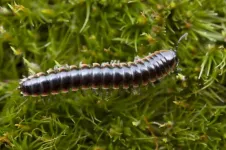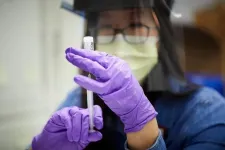Artificial intelligence reveals current drugs that may help combat Alzheimer's disease
Analysis points to new treatment targets for the disease.
2021-03-04
(Press-News.org) BOSTON - New treatments for Alzheimer's disease are desperately needed, but numerous clinical trials of investigational drugs have failed to generate promising options. Now a team at Massachusetts General Hospital (MGH) and Harvard Medical School (HMS) has developed an artificial intelligence-based method to screen currently available medications as possible treatments for Alzheimer's disease. The method could represent a rapid and inexpensive way to repurpose existing therapies into new treatments for this progressive, debilitating neurodegenerative condition. Importantly, it could also help reveal new, unexplored targets for therapy by pointing to mechanisms of drug action.
"Repurposing FDA-approved drugs for Alzheimer's disease is an attractive idea that can help accelerate the arrival of effective treatment--but unfortunately, even for previously approved drugs, clinical trials require substantial resources, making it impossible to evaluate every drug in patients with Alzheimer's disease," explains Artem Sokolov, PhD, director of Informatics and Modeling at the Laboratory of Systems Pharmacology at HMS. "We therefore built a framework for prioritizing drugs, helping clinical studies to focus on the most promising ones."
In an article published in Nature Communications, Sokolov and his colleagues describe their framework, called DRIAD (Drug Repurposing In Alzheimer's Disease), which relies on machine learning--a branch of artificial intelligence in which systems are "trained" on vast amounts of data, "learn" to identify telltale patterns and augment researchers' and clinicians' decision-making.
DRIAD works by measuring what happens to human brain neural cells when treated with a drug. The method then determines whether the changes induced by a drug correlate with molecular markers of disease severity.
The approach also allowed the researchers to identify drugs that had protective as well as damaging effects on brain cells.
"We also approximate the directionality of such correlations, helping to identify and filter out neurotoxic drugs that accelerate neuronal death instead of preventing it," says co-first author Steve Rodriguez, PhD, an investigator in the Department of Neurology at MGH and an instructor at HMS.
DRIAD also allows researchers to examine which proteins are targeted by the most promising drugs and if there are common trends among the targets, an approach designed by Clemens Hug, PhD, a research associate in the Laboratory of Systems Pharmacology and a co-first author.
The team applied the screening method to 80 FDA-approved and clinically tested drugs for a wide range of conditions. The analysis yielded a ranked list of candidates, with several anti-inflammatory drugs used to treat rheumatoid arthritis and blood cancers emerging as top contenders. These drugs belong to a class of medications known as Janus kinase inhibitors. The drugs work by blocking the action of inflammation-fueling Janus kinase proteins, suspected to play a role in Alzheimer's disease and known for their role in autoimmune conditions. The team's analyses also pointed to other potential treatment targets for further investigation.
"We are excited to share these results with the academic and pharmaceutical research communities. Our hope is that further validation by other researchers will refine the prioritization of these drugs for clinical investigation," says Mark Albers, MD, PhD, the Frank Wilkins Jr. and Family Endowed Scholar and associate director of the Massachusetts Center for Alzheimer Therapeutic Science at MGH and a faculty member of the Laboratory of Systems Pharmacology at HMS. One of these drugs, baricitinib, will be investigated by Albers in a clinical trial for patients with subjective cognitive complaints, mild cognitive impairment, and Alzheimer's disease that will be launching soon at MGH in Boston and at Holy Cross Health in Fort Lauderdale, Florida. "In addition, independent validation of the nominated drug targets could provide new insights into the mechanisms behind Alzheimer's disease and lead to novel therapies," says Albers.
INFORMATION:
This work was supported by the National Institute on Aging, the CART fund and the Harvard Catalyst Program for Faculty Development and Diversity Inclusion.
Disclosures
P.K.S. is a member of the SAB or Board of Directors of Applied Biomath, RareCyte, NanoString and Glencoe Software and has equity in some of these companies. In the last five years, the Sorger lab has received research funding from Novartis and Merck. P.K.S. declares that none of these relationships are directly or indirectly related to the content of this manuscript. B.T.H. has stock in Novartis and Dewpoint. N.T.J. is an employee of H3 Biomedicine, a subsidiary of Eisai Inc. that develops therapies for Alzheimer's. S.R., P.K.S., M.W.A., and A.S. are inventors on a patent application (WO/2017/173451) for novel targets in neurodegenerative diseases.
About the Massachusetts General Hospital
Massachusetts General Hospital, founded in 1811, is the original and largest teaching hospital of Harvard Medical School. The Mass General Research Institute conducts the largest hospital-based research program in the nation, with annual research operations of more than $1 billion and comprises more than 9,500 researchers working across more than 30 institutes, centers and departments. In August 2020, Mass General was named #6 in the U.S. News & World Report list of "America's Best Hospitals."
ELSE PRESS RELEASES FROM THIS DATE:
2021-03-04
Hearing the words "new species discovered" may conjure images of deep caves, uncharted rainforests, or hidden oases in the desert.
But the reality is that thousands of new species are discovered each year by enterprising scientists all over the world. Many of these new species do come from exotic locations, but more surprisingly, many come from just down the road, including the newest member of the Hokie Nation, the millipede Nannaria hokie.
The newest Hokie -- which has about 60 more legs than the HokieBird -- was discovered living under rocks by the Duck Pond behind the Grove on Virginia Tech's Blacksburg campus. Since then, the critter has been found at the area commonly referred to as stadium ...
2021-03-04
New research at Washington University School of Medicine in St. Louis indicates that three new, fast-spreading variants of the virus that cause COVID-19 can evade antibodies that work against the original form of the virus that sparked the pandemic. With few exceptions, whether such antibodies were produced in response to vaccination or natural infection, or were purified antibodies intended for use as drugs, the researchers found more antibody is needed to neutralize the new variants.
The findings, from laboratory-based experiments and published March 4 in Nature Medicine, suggest that COVID-19 drugs and vaccines developed thus far may become less effective ...
2021-03-04
Texas A&M University College of Medicine ressearchers have recently discovered that cytisine -- a smoking cessation drug commonly used in Europe -- reduces the loss of dopamine neurons in females. These findings provide potential evidence for the use of the drug to treat Parkinson's disease or stop its progression in women.
Sara Zarate and Gauri Pandey, graduate students from the lab of Rahul Srinivasan, assistant professor in the Department of Neuroscience & Experimental Therapeutics, are co-first authors of the research. Their findings are published in the Journal of Neurochemistry.
There ...
2021-03-04
Plants, fungi, and bacteria produce natural products that function, among other things, as defenses that are deployed against predators and competitors. In medicine, these compounds are used for antibiotics, cancer drugs, and cholesterol reducers. The team working with associate professor Dr. Robin Teufel and Dr. Britta Frensch of the Institute of Biology II of the Faculty of Biology of the University of Freiburg was able, together with researchers from the ETH Zürich in Switzerland, to shed light on the key role of three enzymes that are involved in synthesizing a class of natural products. The researchers are publishing their findings in the latest edition of "Nature Communications."
Actinobacteria produce many natural products, such as those that are ...
2021-03-04
Many species might be left vulnerable in the face of climate change, unable to adapt their physiologies to respond to rapid global warming. According to a team of international researchers, species evolve heat tolerance more slowly than cold tolerance, and the level of heat they can adapt to has limits.
In a study published in the Nature Communications, McGill professor Jennifer Sunday and her co-authors wanted to understand how species' thermal limits have evolved. To examine variation across the tree of life, the researchers developed the largest available database compiling thermal tolerances for all types of organisms (GlobTherm database).
The ...
2021-03-04
SAN ANTONIO, March 4, 2021 -- People who have had major sinus surgery should consult their ENT doctor before undergoing COVID-19 swab testing, new research indicates.
Likewise, those performing swab testing should ask whether the patient has had extensive sinus or skull base surgery, said END ...
2021-03-04
Shark scientists at Georgia Aquarium, Scripps Institution of Oceanography at UC San Diego, and Dalhousie University are challenging the status quo in shark and ray mating research in a new study that looks at biological drivers of multiple paternity in these animals. The results were published March 4 in the journal Molecular Ecology.
Many species of sharks and rays exhibit multiple paternity, where females give birth to a litter of pups that have different fathers. While widely documented in scientific literature, the drivers of this phenomenon are not well understood. However, previous research has cited male aggression as ...
2021-03-04
NEW YORK, NY (March 4, 2021)--Inflammatory heart disease is a rare finding among professional athletes with mild or asymptomatic COVID-19 infection, a large-scale study has found.
The study, led by Columbia University Vagelos College of Physicians and Surgeons in collaboration with the major North American sports leagues and their respective players' associations, was published online today in JAMA Cardiology.
Athletes and COVID-19
Studies suggest that approximately 20% of patients hospitalized with severe COVID-19 develop some type of heart damage, but the impact of mild or asymptomatic ...
2021-03-04
March 4, 2021 -- COVID?19 has altered the labor market for millions of people, including public health graduates, yet an analysis of job postings for Master's level public health graduates showed that job postings remained at the same levels as before the pandemic, according to a new study at Columbia University Mailman School of Public Health. The findings are published in the International Journal of Health Planning and Management.
"Due to the crucial role of disease prevention in responding to and recovering from the COVID?19 pandemic, assessing the public health workforce remains critically important," said Heather Krasna, MS, EdM, assistant dean of career services at Columbia Mailman School, and lead author of the study. "Fortunately, the job market for master's ...
2021-03-04
PHILADELPHIA (March 4, 2021) - Equitable implementation of COVID?19 vaccine delivery is a national and global priority, with a strong focus on reducing existing disparities and not creating new disparities. But while a framework has been recognized for equitable allocation of COVID?19 vaccine that acknowledges the rights and interests of sexual and gender minorities (SGM), it fails to identify strategies or data to achieve that goal.
A new study with support from researchers at the University of Pennsylvania School of Nursing (Penn Nursing) examined the prevalence ...
LAST 30 PRESS RELEASES:
[Press-News.org] Artificial intelligence reveals current drugs that may help combat Alzheimer's disease
Analysis points to new treatment targets for the disease.


